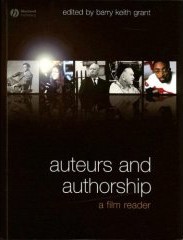
'Auteurs and Authorship- A Film Reader' By Barry Keith Grant ,
Oxford: Blackwell Publishing, 2008.
ISBN 978 1 4051 5334 8 323pp. (softcover) £19.99
Given the huge impact the concept of Authorship has had on film history
and film theory, it is highly surprising that few publications have
dealt with it exclusively, the majority instead preferring to cite it
as one theory amongst others. One book that does dedicate itself to the
subject is John Caughie’s excellent Theories of Authorship,
but, astonishingly, this is now over a quarter of a century old. Thus,
the time is more than ripe for a new pretender to the crown to step
forward- enter stage left Barry Keith Grant’s new book Auteurs and
Authorship- A Film Reader.
The whole concept of Authorship is a paradoxical one- superficially
simple, but with an undercurrent of complexity that has spawned whole
thesis and critical debate which can become so dense that the idea
itself becomes subsumed ‘neath a fog of rhetoric. At its most simple
level, an “auteur” (=author) is usually a director who exhibits a
consistent thematic and stylistic approach across a body of their work.
This basic notion, though, is complicated by widening the concept to
include stars, producers and even studios themselves. Furthermore, it
presupposes a snobbishly empirical point of view whereby certain
directors become almost canonised for their consistency and woven
tapestry of familiar themes and others are disregarded like used
matches for not having this discernibly systematic approach.
Intriguingly, as the term became used within film criticism in the
1960s largely thanks to Andrew Sarris, there was a tendency to look back
rather than forward, meaning that many directors who started
their careers in the 1970s have been overlooked when it comes to formal
studies of their work.
Given my two points thus far- that Auteurs and Authorship is a
much overdue title and also that there is a need for contemporary
authorial discussion; it would be tempting to assume that Barry Keith
Grant presides over a book that has just that modern focus. Not so.
Instead, he brings together key writings on the topic in a book of
three main sections. Firstly, there is a chronological overview of the
key articles which enables the development of auteurism to take
place in its historical context. Secondly, the problems of limiting
film authorship to merely a discussion of directors is firmly addressed
through a range of articles from Roland Barthes’ landmark essay ‘The
Death of the Author’ (1968) to Matthew Bernstein’s ‘The Producer as
Auteur’ (2006). Finally, a section entitled ‘Close Readings’ presents
studies of individual directors ranging from John Ford and Douglas Sirk
to Dorothy Arzner and Oscar Micheaux. In essence, Grant’s book could
flippantly have been titled Everything You Always Wanted To Know
About Authorship But Were Afraid To Ask, as the vast majority of
the core pieces on film authorship are indeed present within its pages.
The one surprising omission is Alexandre Astruc’s groundbreaking essay Birth
of a New Avant-Garde(1948) which embraced the idea of the camera-stylo
which was a major influence on Truffaut’s A Certain Tendency of the
French Cinema(1954), which is present.
With the increasing numbers of books about almost every facet of cinema
appearing on bookshelves weekly, the question of originality frequently
raises its head. How much need is there for another book about
Authorship if you own the Caughie volume? The answer is that there is
great need- both, inevitably, contain some of the same material, but
both too are different. The important thing about Barry Keith Grant’s
Auteurs and Authorship is that it brings a very contemporary debate
up to the present day as well as presenting some intriguing profiles
whose disparate nature place them outside the remit of Caughie’s book.
Overall, the books should be used in conjunction, be studied as a
complimentary pair, and even take their place side by side on even the
most meagre cineaste’s bookshelf.
'Auteurs and Authorship- A Film Reader' is published by Blackwell.
Blackwell
website
Back
Home

